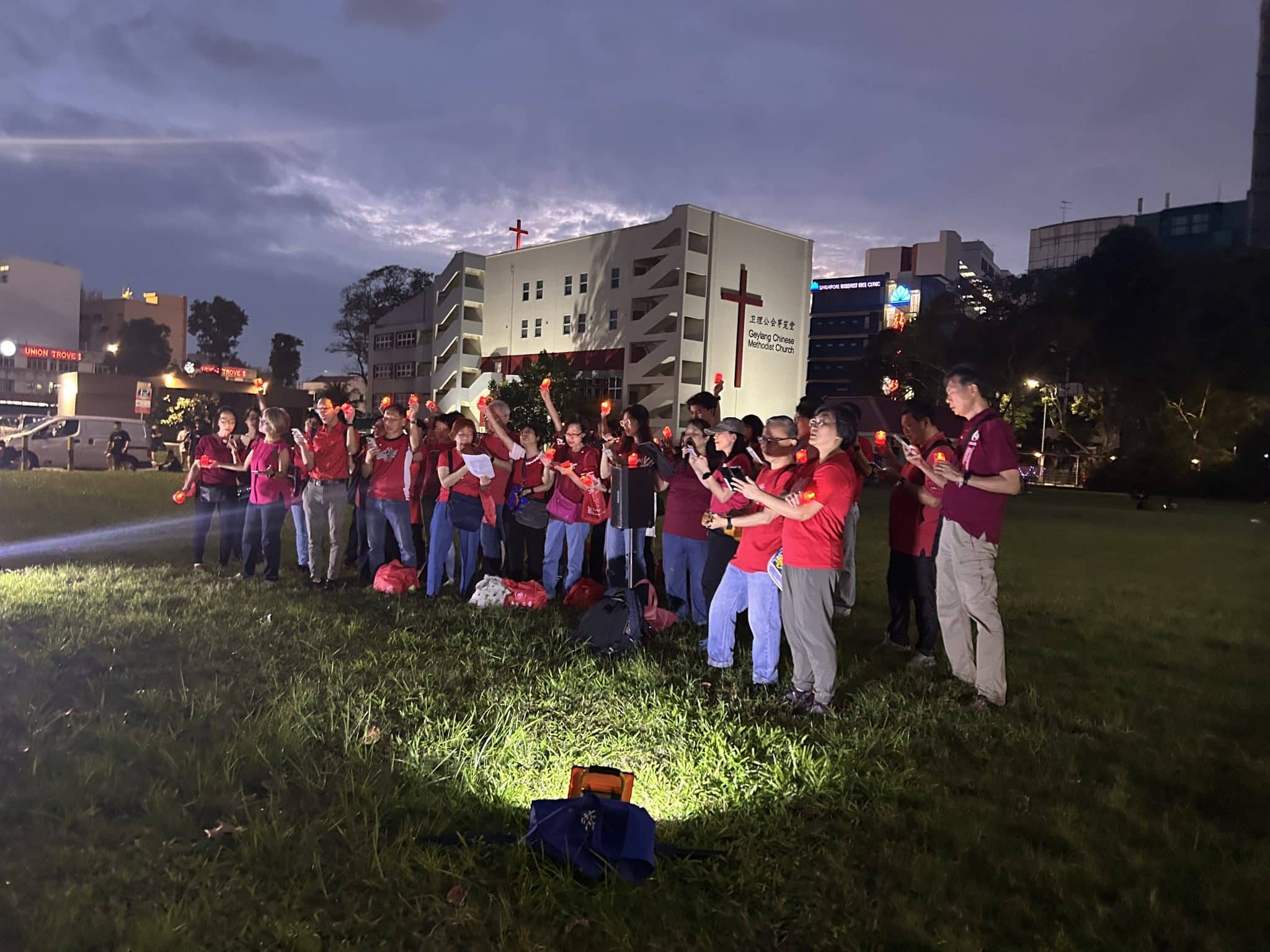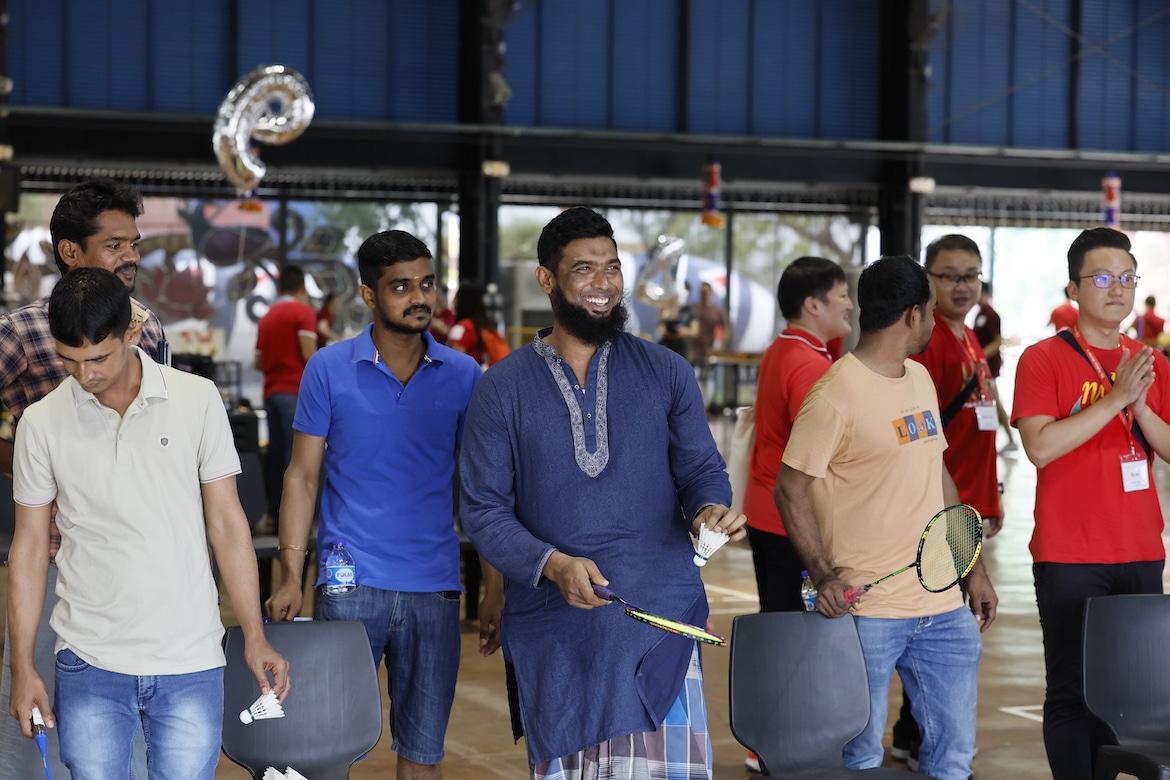“We talk about going overseas for missions, but what about the two million seafarers God brings to our shores every year?”: International Lutheran Seafarers’ Mission
by Gemma Koh // April 12, 2025, 10:50 am
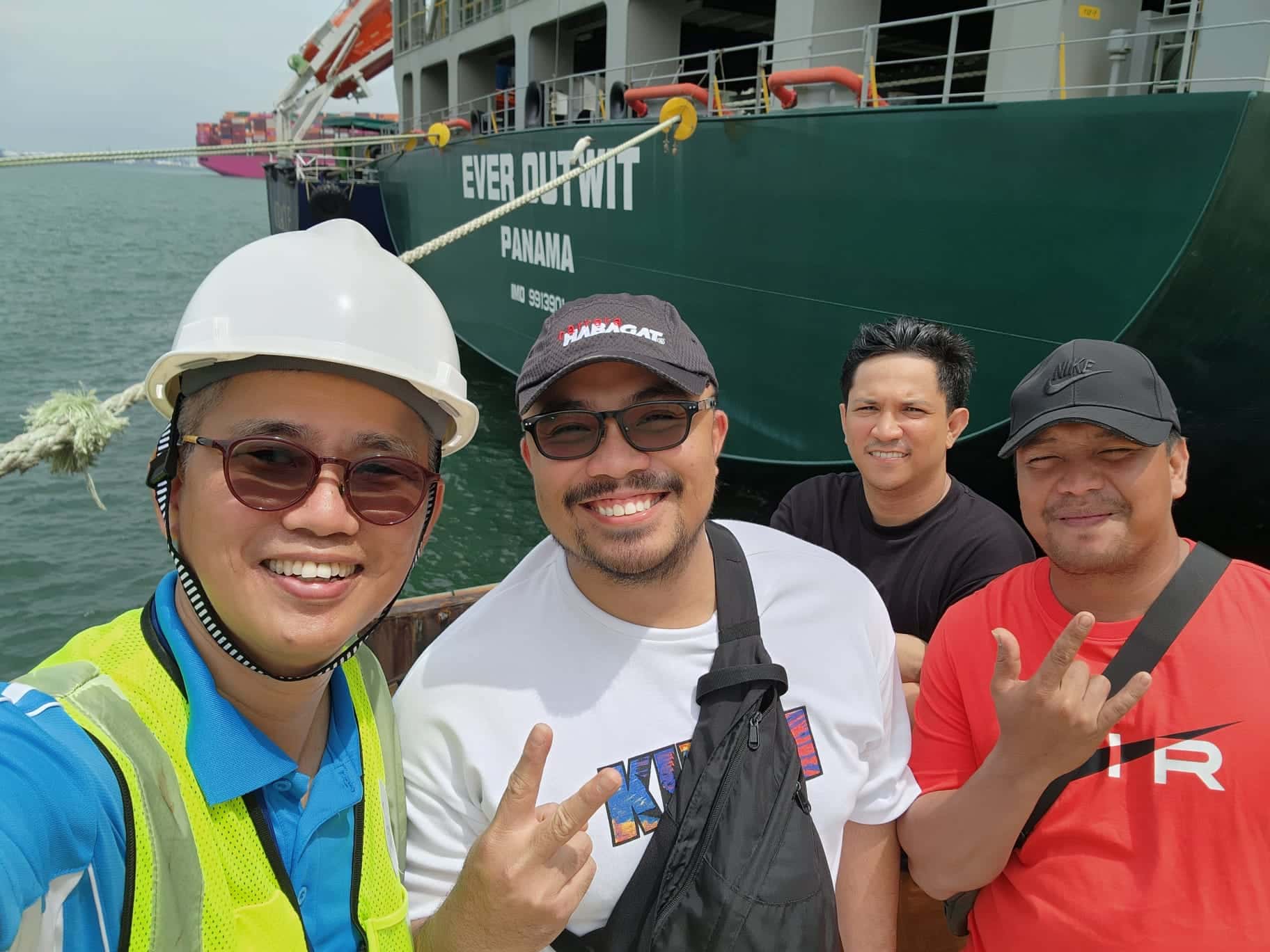
“Singapore is so blessed to be the world’s largest transshipment hub – we have a special responsibility to the seafaring community,” says Bryan Tay, General Manager (Operations) of International Lutheran Seafarers' Mission. Photos courtesy of ILSM.
They are an unseen group of migrant workers who hail from all corners from of the globe. They endure months on a ship and face dangers on the high seas; for many of them, stepping onto ground is a rare luxury.
Every year, there are some 200,000 vessel calls in Singapore, feeding our economy, bringing the bulk of our supplies and online shopping. Of this, an estimated 100,000 are unique vessels.
“The fact that Singapore is so blessed to be the world’s largest transshipment hub* means we have a special responsibility to the seafaring community,” Bryan Tay, General Manager (Operations) of International Lutheran Seafarers’ Mission (ILSM) told Salt&Light.
(*A crucial interchange in global shipping where cargo containers are temporarily unloaded, transferred and reloaded onto other vessels for onward transport to their final destinations).
“Unlike land-based migrant workers who have access to community and spiritual support, seafarers often find themselves socially isolated and spiritually unsupported.

ILSM Operations Executive A’Fowsh Flora (left) paying a visit to seafarers – both female and male – aboard a container ship.
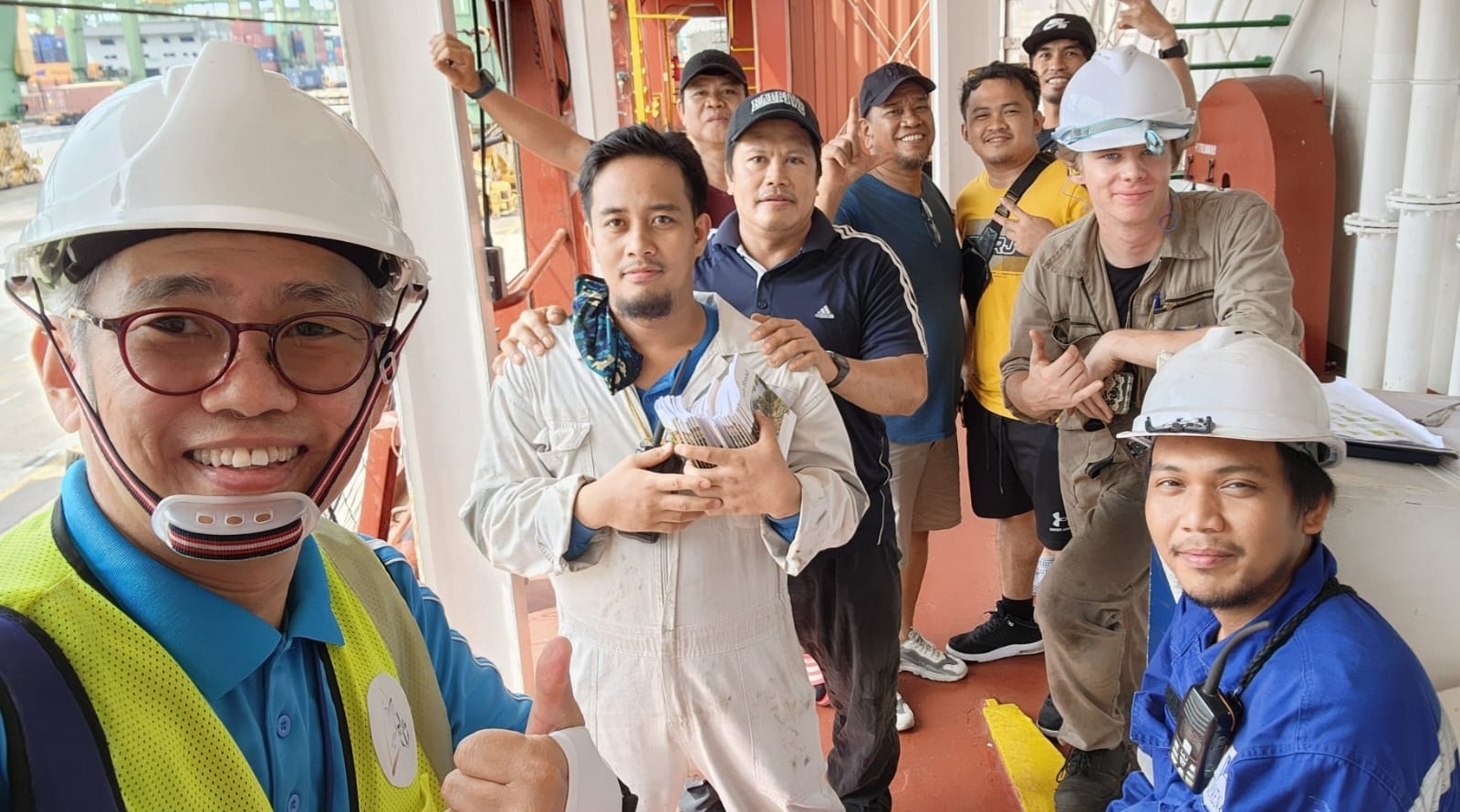
“Getting off the ship and having somewhere to go, even if they have a short time on land, will benefit them greatly,” said Bryan Tay (left).
“We talk about going overseas for missions, but what about the two million seafarers God brings to our shores every year? Or the thousands of crew who come on fishing vessels?”
At PSA container terminals at Tuas and Pasir Panjang, ILSM staff and volunteers climb the gangways to visit those who are unable to disembark. It also extends a free meet and greet service for those who are able to step ashore.
Additionally, they run the drop-in welfare centre for fishing crew who come through the Jurong Fishery Port. It is one of nine migrant worker recreation centres in Singapore. In 2024, they engaged with almost 5,000 fishing crew members.
The welfare centre is a safe, comfortable place with food and games, created to allow fishing crew to rest and relax after months at sea. There is also free wifi for them to reconnect with their families.
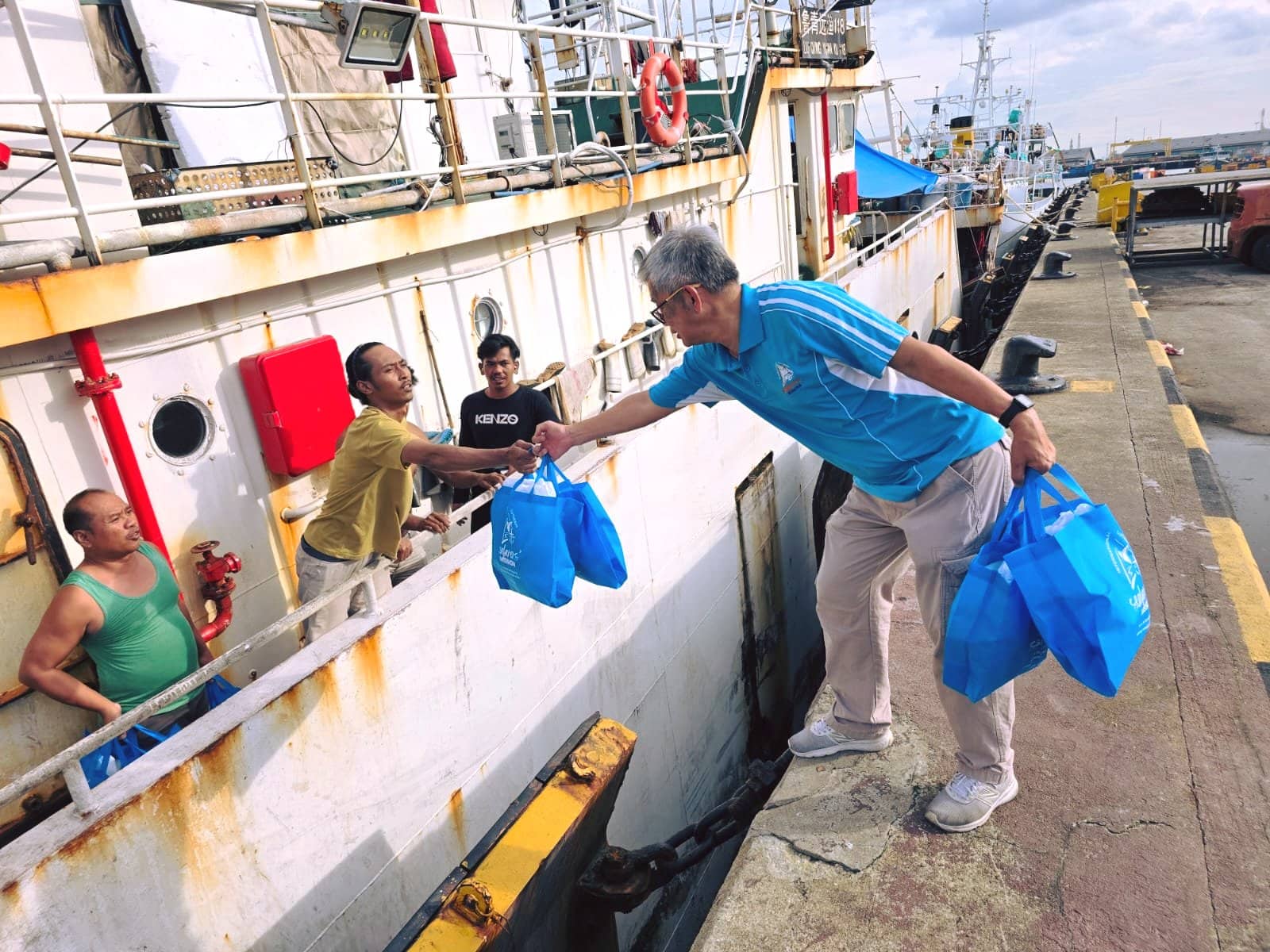
Bryan distributes thank you gifts to welcome fishermen back to land. Those on large trawlers (pictured) may have spent months, even a year at sea, filling the hold with catch. The fishery port at Jurong also receives smaller wooden boats with crew who transport fish from Indonesia to Singapore.
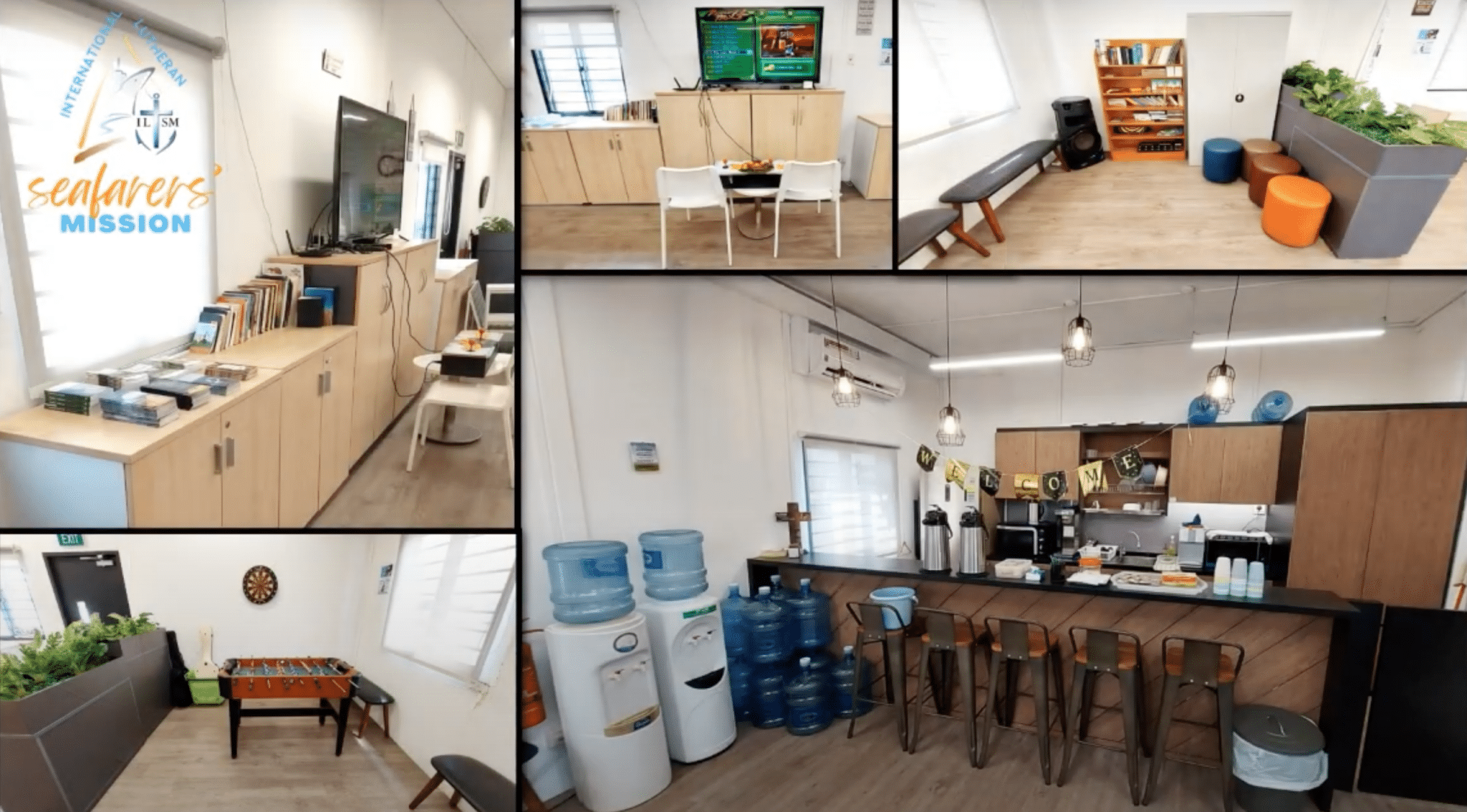
Looking for: Volunteers to extend hospitality to those who drop in to the welfare centre ILSM runs at Jurong Fishery Port.
ILSM is also looking to raise funds to set up a similar welfare centre for seafarers near the new Tuas terminal by the end of the year. No such centre exists there at the moment.
“Getting off the ship and having somewhere to go, even if they have a short time on land, will benefit them greatly,” adds Bryan.
It will also act as a friendly tourist information centre for seafarers who have more time to go on to explore Singapore.
“With critical mass growing as container operations progressively move to Tuas, we want to be the first port of call for seafarers docking in Singapore.”
At its targeted completion in the 2040s, Tuas Port will have a handling capacity of 65 million 20-foot equivalent units (TEUs). That is almost double the volume of 37.5 million TEUs handled in 2021. (Editor’s note: Containers used in international shipping are usually 20-foot or 40-foot in length).
“We want to bring faith, hope and love to the seafaring community,” said Bryan.
But this is not something that ILSM or their supporting Lutheran congregations can do alone.
They are rallying like-minded people to come onboard as volunteers on an ongoing basis.
They are also looking for helping hands to honour seafarers at their inaugural carnival on Sea Sunday, June 22 – and calling for churches to help by raising awareness of and funds for the ministry.
ILSM transitioned fully to a local team in February 2024, taking over ownership of the mission that had, for 25 years, relied on missionaries sent from Evangelical Lutheran Church in Bavaria (ELCB), Germany.
Climbing to connect
“Seafarers working on container ships constantly move from port to port, much like on a bus route. A voyage could take anywhere from a day to a month before they reach the next stop,” explained Bryan.
“Depending on the ship’s time in port (usually 10 to 30 hours) and their role and duties, not all may be able to disembark.
“The days can be mundane, routine and blank,” he said, describing how he shuttled between his work and accommodation space daily – four hours on, eight hours off – as a marine engineer cadet.
“Seafarers are away from home for four to eight months at a time, before they return home for a few months. The cycle repeats itself when they return to sea for their next contract.”
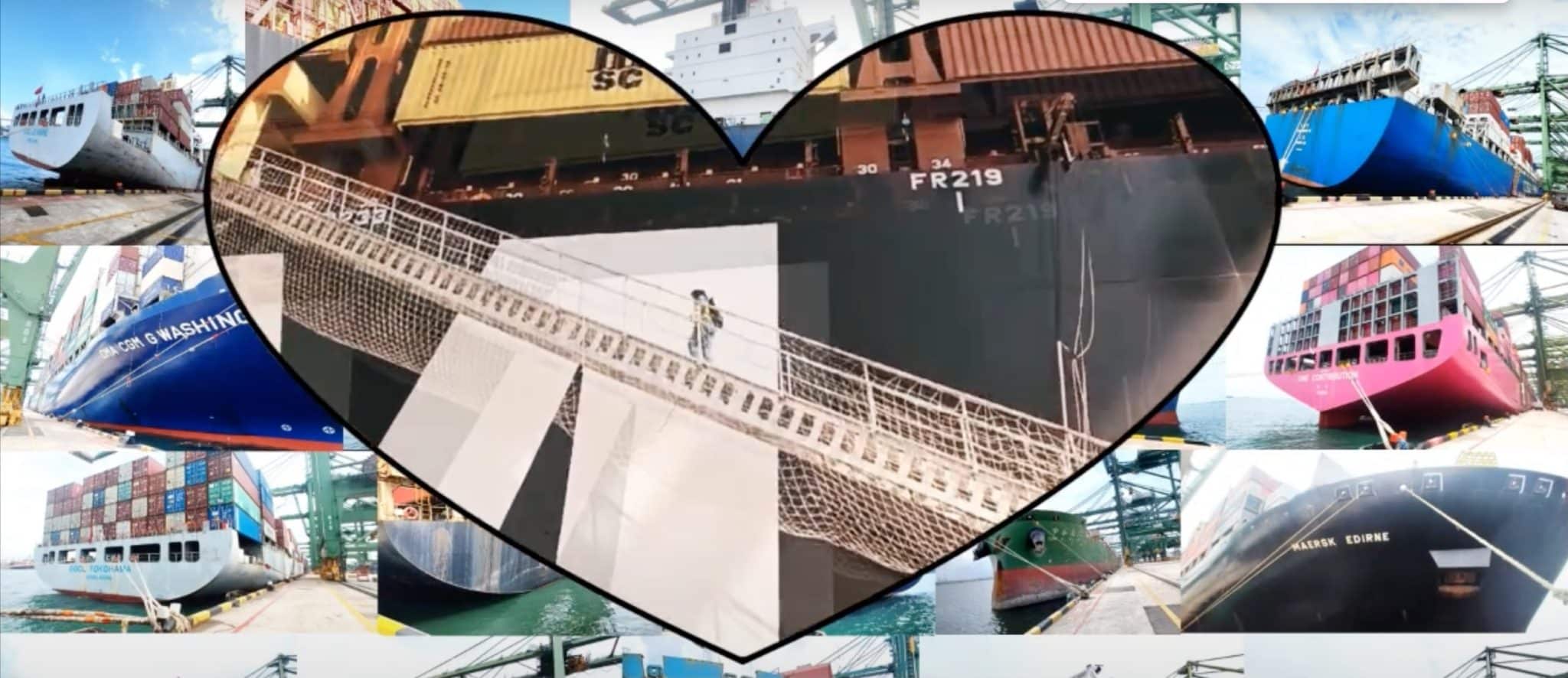
The ILSM team set out to visit 100 ships a month when the organisation was localised in February. Within six months, they had made their 1,000th ship visit. Screenshot from ILSM video.
Similarly, workers on fishing vessels would stay at sea for six to 12 months to catch a full load before returning to port.
“It could be months before they ‘smell’ land,” said Bryan.
This prolonged physical and emotional separation from their loved ones takes a significant toll, leaving them vulnerable to depression, loneliness and hopelessness. Access to the Internet is limited, and video calls are of little comfort when issues arise at home.
Four mornings a week, ILSM staff and volunteers visit container ships “to reduce this social isolation, and bring a slice of humanity and comfort to those who keep the world moving from the decks of their vessels.”

“I’m just showing the love that Jesus first showed me”: Bryan’s response to a Montenegro crew member’s comment that he was Santa Claus bringing cheer to them.
ILSM is looking to build a pool of fit and willing volunteers to climb the 50 to 85 steps up the gangways to connect with seafarers who are unable to disembark.
A conversation may only last 10, 20 minutes, but could make an impact. Bryan recalls one such conversation with a chief cook.
“After talking with him, I asked if I could pray for him. He said yes, and started tearing.
“Slowly, he told me, ‘My mother has a terminal illness. It will be four weeks before I sign off, and I’m not sure I will be home on time for her.
“I haven’t told anyone because I don’t want people to pity me. So every night, I just drink myself to sleep.’
“So I prayed for peace and healing for his mother. I also prayed that he can go back and spend a joyful time with her.
“As I prayed for him, he cried. I also cried.”
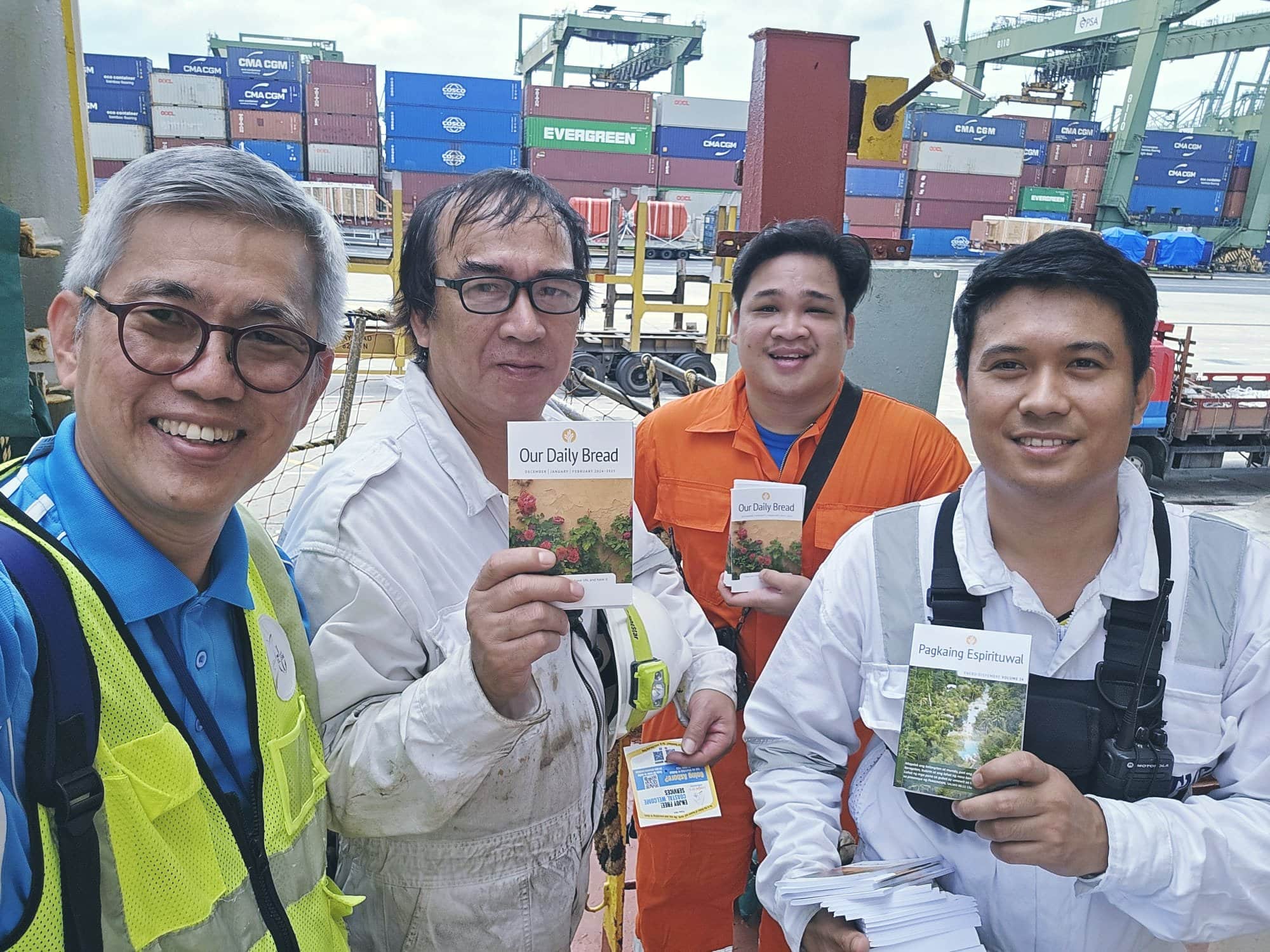
In 2024, ILSM gave out 10,000 copies of Our Daily Bread in various languages. It also distributes useful booklets on topics such as how to reduce stress.
Bryan notices that offers of prayers to bless seafarers and the ship are appreciated by both Christians and non-Christians. All the more so when “things happen on board – someone committed suicide or jumped overboard, or someone experienced a trauma.”
Common requests are prayers for safety, health, career, and their family back home.
“Beyond emotional struggles, ships are not the easiest places – physically or spiritually – for Christians to maintain their faith,” Bryan said candidly. “There are often temptations such as alcohol, smoking and more.”
Bryan – who has over 25 years working in various sectors of the maritime industry — recalls his first voyage as a “raw and green” 21-year old marine engineering cadet.
A seaman with 20 years of experience wanted to take him ashore to “find a woman”.
“When I declined, I was told, ‘Don’t worry. You don’t need to pay. They pay you because you are a spring chicken.’
“It may sound funny, but I can’t imagine how many times this is repeated to new seafarers.
“This is why we want to board the ships and encourage Christian seafarers, and put faith-related materials in their hand. And we pray for the Holy Spirit to spark faith and fire them up to lead godly lives, and to make a difference and be powerful witnesses for Him onboard and wherever they go.”
A warm shore welcome
Bryan estimates that only 1% of seafarers (or 20,000) coming through Singapore get to set foot on land. Those who do may have between four to 10 hours of shore leave and freedom to roam.

Wanted: Volunteers to provide a warm welcome to disembarking seafarers at Pasir Panjang and Tuas terminals, and provide a brief orientation to getting around Singapore.
Interested seafarers can contact ILSM for the free meet and greet service (click here), where they are ferried from ship through immigration to a nearby area outside of the port.
“Coastal welcome guides are a warm, helpful presence during the seafarer’s first half hour or hour on land,” Bryan said. “They offer practical help like showing them where the money changer is, and explaining how to get around, before the seafarer goes off to explore Singapore on their own.”
“In that short time, there are opportunities to share God’s love – sometimes through a gesture, a kind word. If there’s a connection, it could be through a simple conversation enquiring about their well-being and their faith, and an offer to pray for them.”
Urgent need for more hands and hearts
Currently, ILSM operates with just three staff members and five regular volunteers. Their work is supported by the five Lutheran congregations, but Bryan emphasises that the help needed is far more.
“This is not an ‘ILSM thing’ or a ‘Lutheran thing’. This is God’s thing. We are looking to grow this network to ensure that every member of the seafaring community is greeted with warmth, care, and the love of Christ.
“We often talk about offering help and hope in terms of fishing. We are seeing them at the source. If the ‘fish’ are on the boats, or jumping ashore at the ports, and we’re not there to catch them, where are we expecting to reach them?”
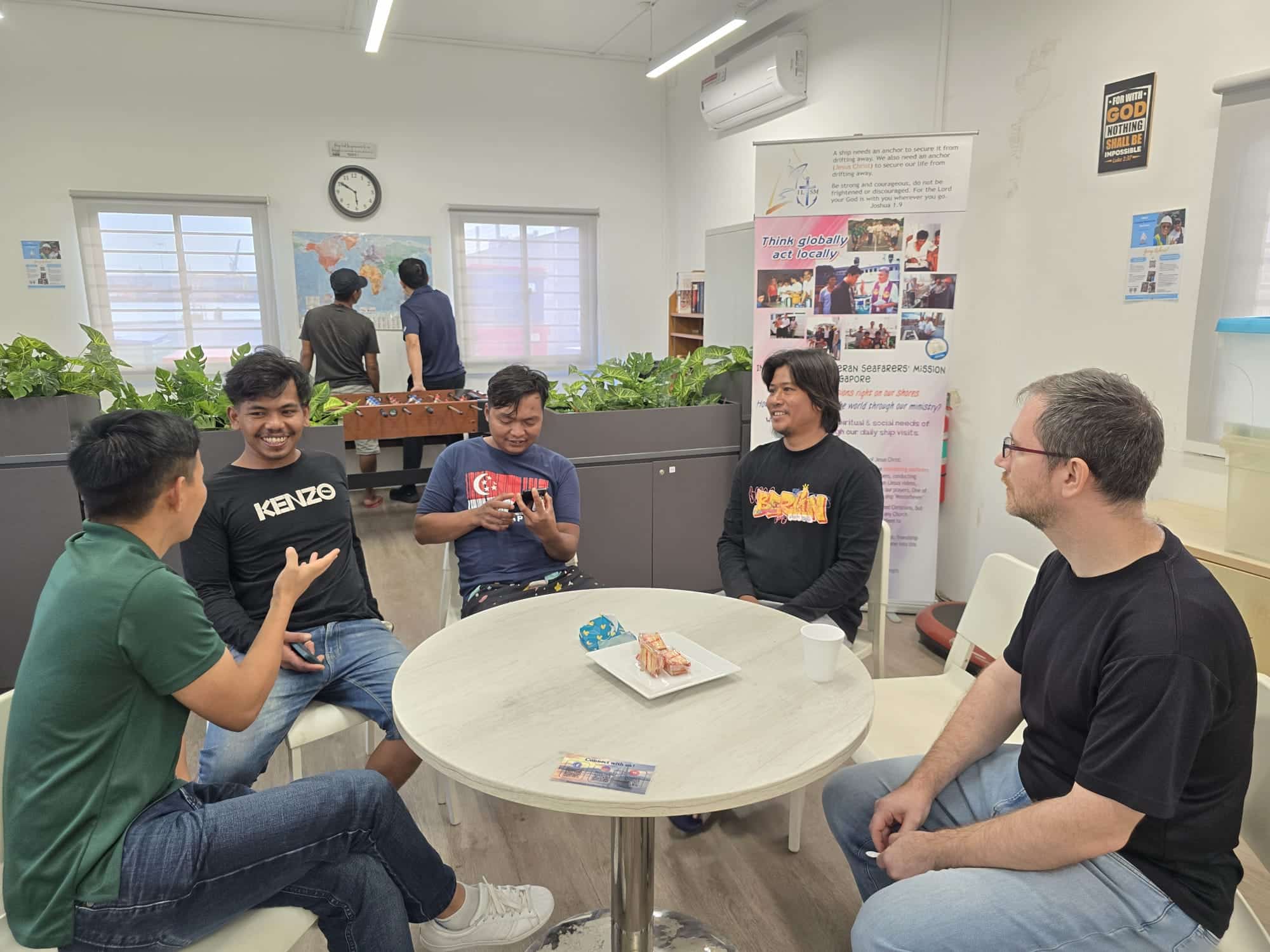
Students from East Asia School of Theology befriending fishing crew at the welfare centre in Jurong.
From helping to raise awareness to being an ongoing volunteer, or a helper during the inaugural Seafarers’ Carnival, here are myriad ways of how you can get involved with ILSM’s ministry:
1. Volunteer as a coastal welcome guide: Welcome and orientate seafarers when they get off the container ships. Show them kindness, offer practical guidance, and, if the opportunity arises, offer to pray for them.
2. Volunteer to visit the ships: If you’re fit and willing, you will climb the gangways to bring encouragement, prayer and useful, faith-based reading materials to seafarers who cannot disembark.
3. Contribute to the setting up of the Tuas Seafarers’ Friendship Centre: As container port operations progressively move to Tuas, ILSM is seeking contributions to set up the first centre in the area for seafarers near the Tuas Link MRT.
“If 10 churches are able to pledge $500 a month, we will be able to get the friendship centre up and running by the end of this year,” said Bryan.
4. Offer hospitality at the welfare centres: “We need people who are passionate in prayer, and who can show care and engage with the seafarers,” he said.
5. Pray for the seafaring community and the ministry: Pray for their safety, for their families and the strengthening of Christian crew members, and for open hearts.
6. Actively participate in the inaugural Seafarers’ Carnival (Sunday 22 June, 2025):
- Mobilise volunteers to support the carnival which is hoping to welcome up to a total of 1,200 visitors including seafarers, fishermen and land-based migrant workers. Volunteers are needed as stage presenters, to man the game stalls and activity booths, help with ushering and crowd management, amongst other roles.
- Provide transportation (like MPVs or mini-buses) and drivers to ferry seafarers between the ports (Tuas as well as Pasir Panjang) and the carnival which will be held at NTUC Club Recreation Centre at Tuas.
- Provide sponsorship in kind: Door gifts, prizes for games, or gift items for a blessings draw. You can also set up a food or game stall at the carnival. Or you could donate goods to give away for free or for sale (all proceeds will go to ILSM).

After months at sea, fishing crews are delighted to receive goodie bags and pick out sets of donated clothes.
- Participate in campaigns to promote the events (via your website, social media, or by putting up publicity posters).
ILSM is organising the carnival together with the Migrant Workers Centre (MWC), Hope Initiative Alliance, Alliance of Guest Workers Outreach and the Lutheran Church in Singapore.
7. Show support on Sea Sunday (Sunday June 22, 2025):
- Make an announcement and screen a short video at your worship services to honour seafarers (ILSM will provide your church with the relevant material).
- Help raise funds by collecting a special offering which will help ILSM to:
a. Pay for more than 12,000 copies of Our Daily Bread (in English, Mandarin, Tagalog and Bahasa Indonesia) via more than 1,000 ship visits a year at the container terminals.b. Provide free refreshments and Internet access for more than 5,000 fishermen a year at the drop-in centre at Jurong Fishery Port.
c. Provide free transportation for more than 3,000 seafarers out of port (and to nearby shore destinations) when they come ashore.
“If 50 people in each church are able to give $50 each, they can raise $2,500 for ILSM. If there are 40 churches that can raise this, we will have $100,000,” said Bryan.
ILSM hope to raise $100,000 through donations from churches.
For more information on volunteering and donating, click here. Churches that wish to find out more can email Bryan Tay at [email protected]
About International Lutheran Seafarers’ Mission
Formed under the auspices of the Lutheran Church in Singapore, International Lutheran Seafarers’ Mission (ILSM) was registered as a society in 1999. According to the Maritime and Port Authority of Singapore (MPA) website, it is one of five Christian missions carrying out welfare services for seafarers.
For 25 years, the organisation depended on missionaries sent here by the Evangelical Lutheran Church in Bavaria (ELCB), Germany.
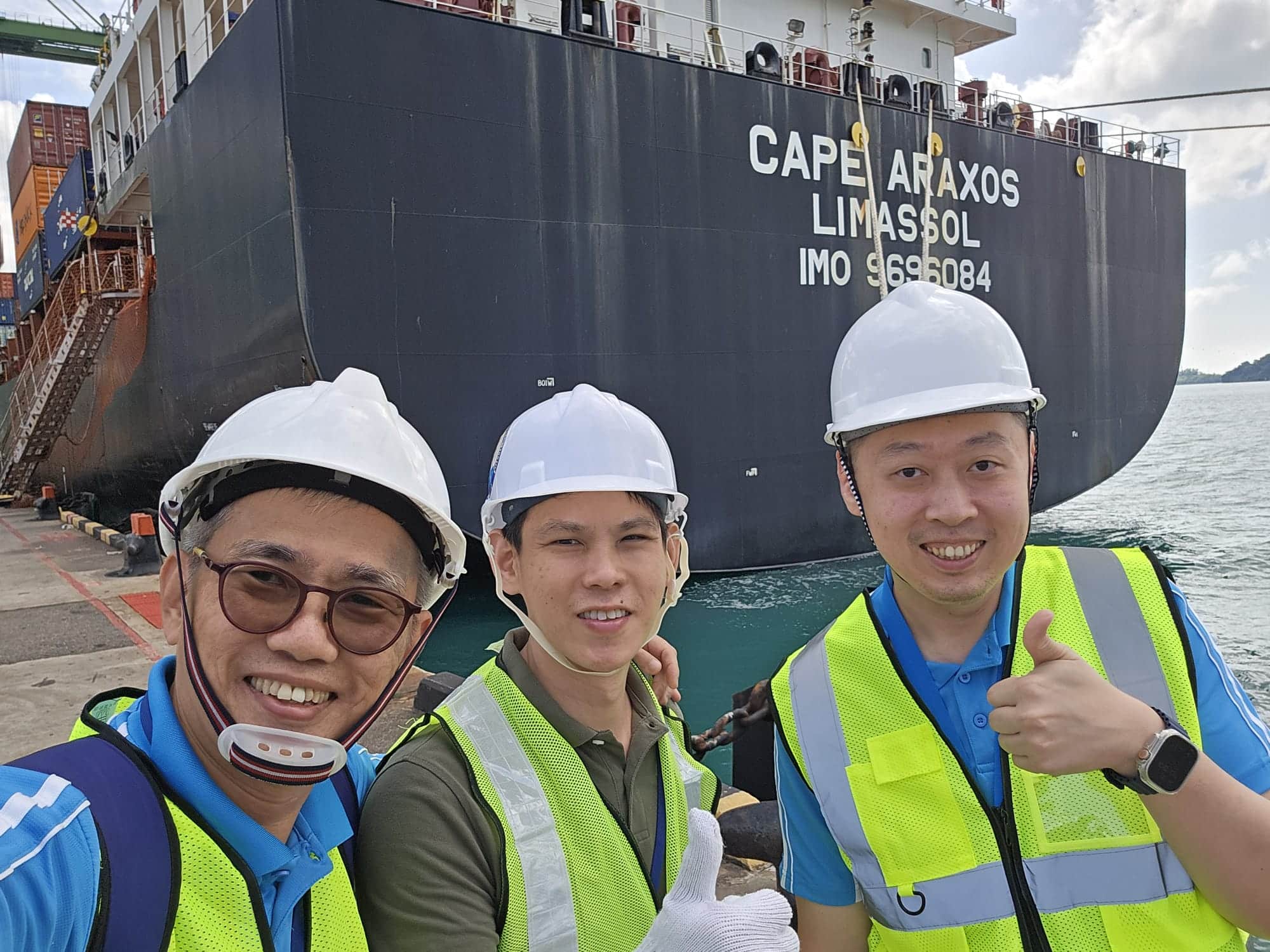
Bryan (left) with volunteer ship visitor Varian Chong (centre), and new staff member – senior operations executive, Dedry – on their first ship visit at Pasir Panjang Terminal in March.
“A few years ago, we discerned that the time was right for us to form a local team as it would provide greater continuity, sustainability and ownership of the mission,” said Bryan, who began serving on the ILSM board at the suggestion of Terry Kee, the former Bishop of the Lutheran Church in Singapore, himself a board member.
In February 2024, the team was localised. They set a target to visit 100 ships a month. God blessed their work, and within six months (in October), they had exceeded their target and made their 1,000th ship visit.
“There are people on board who are looking for faith, hope and love. It could be the first and last time that they hear the name of Jesus spoken into their ears. So we want to be there.
“The vision is to see ILSM set up an international fellowship centre for seafarers’ welfare,” explained Bryan.
“We also want to eventually provide spiritual and practical support to all maritime workers, including port workers. But we will still primarily care for the seafaring community, for whom social isolation is a big issue.”
RELATED STORIES:
Who’s looking out for our foreign domestic workers during Circuit Breaker?
We are an independent, non-profit organisation that relies on the generosity of our readers, such as yourself, to continue serving the kingdom. Every dollar donated goes directly back into our editorial coverage.
Would you consider partnering with us in our kingdom work by supporting us financially, either as a one-off donation, or a recurring pledge?
Support Salt&Light
